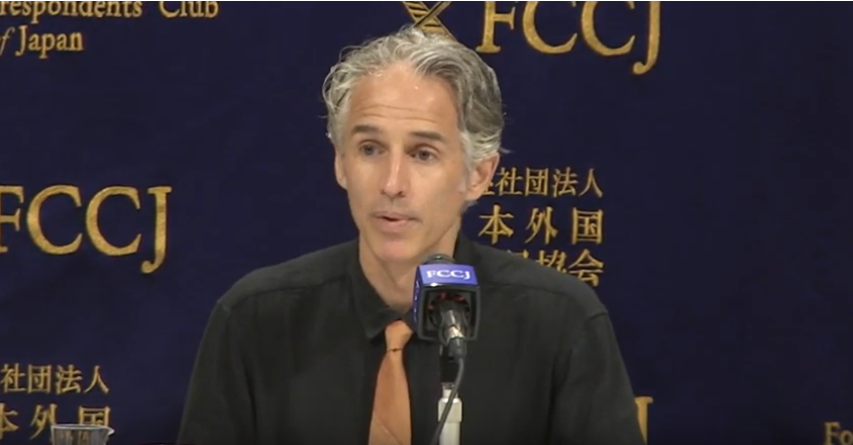Politics and Government Chair Boykoff Speaks Out Against IOC, Beijing Games
The first events of the Beijing Winter Olympics take place Feb. 2, but not without controversy. Pacific University Professor Jules Boykoff, chair of the Politics and Government Department, is a go-to voice of skepticism about the Games, and a particular critic of the choice to award them to Beijing.
A former professional soccer player and one-time member of the U.S. national U-23 squad, Boykoff has recently been quoted or published in the Washington Post, Time, The Guardian, The Nation and many other publications. He’s also written multiple books on the Olympics and teaches Pacific courses on politics and sports, as well as the politics of dissent. He offered this overview of what’s going on with the Games.
 Pacific: Let’s talk about China. What’s the one big reason why these are problematic games?
Pacific: Let’s talk about China. What’s the one big reason why these are problematic games?
Boykoff: I think the main reason is that the human rights situation in China, whether you’re talking about the persecution of Uyghur Muslims in Xinjiang Province, the long-term suppression of Tibetans, the repression carried out against Hong Kong democracy activists; all of that clashes mightily with the spirit of the Olympic charter, and with specific ideas in the Olympic charter around the idea of preserving dignity for all people. For that reason alone, Beijing should be ineligible to be the host of the Olympic Games.
Pacific: Does it feel like a half-measure to you, what the United States is doing with a diplomatic boycott?
Boykoff: Obviously the Biden administration is trying to shine a spotlight on the human rights problems in China. The goal in that is to prevent what a lot of people in sports studies call “Sportswashing,” using these sports megaevents to try to launder your reputation on the world stage.
It’s been interesting to me to see how few countries have come along and joined the boycott. I think that indicates a couple of things. One is the rising power of China as a geopolitical force in the world, and (the other) is the painful fact to a lot of people that the United States as a global power is in decline.
They couldn’t do a full sports boycott because of the fact that when they did that in the 1980s, it was met with vociferous dissent from Olympians in the U.S., who have an asterisk next to their names when it comes to the Olympics. Many of those people have been long outspoken about it and have a sour taste in their mouths. I think that made it almost impossible for the Biden administration to do that.
One quirky historical fact is that China boycotted the 1980 Olympics in Moscow because of the invasion of Afghanistan. And here they are, 42 years later, saying it’s ridiculous to engage in politics. Well, that’s selective morality.
Pacific: Is there a way to have an event that really celebrates athletes and isn’t clouded by politics?
Boykoff: If we were to talk about the possibility of improving the Olympics, I think we’d have to start in two places. One is by improving the transparency of (the International Olympic Committee), and relatedly, increasing the Olympics democracy quotient. Meaning, if city leaders decide they want to host the Olympic Games, then the people of that city — everyday people, working people, people who would never be able to afford a ticket to the Olympics — should have a say in some manner. I don’t believe it’s too much to ask if a city wants to hold the Olympics, they should also hold a referendum where the people can weigh in and decide if they actually want to have the Olympics in their city.
The International Olympic Committee has zero interest in that whatsoever, unfortunately. In fact, they’ve gone in the opposite direction.
I think the Olympics really require a pretty massive overhaul at this point. One way you could do it is to bring in critically minded former Olympians and have them basically run the show.
I only say that because there’s such a zeitgeist right now of socially conscious, politically minded, politically interested athletes out there. I think it’s fair to call what we’re living in the athlete empowerment era. They couldn’t do much worse, to be honest, than the International Olympic Committee, and I think they could actually do a whole lot better.
Pacific: Yet we know nothing like that will happen.
Boykoff: It’s a long shot, no question about it.
Pacific: Is there something about events with athletics at the center, but organized by this apparatus that’s corrupt, that means, as long as there’s money involved, it will happen this way?
Boykoff: In my book Celebration Capitalism in the Olympic Games, I chart how the Olympics have essentially become a form of what I call celebration capitalism. What you see with the dynamics of celebration capitalism in the context of the Olympics is that it’s basically a form of trickle-up economics. It benefits the already well-connected political and economic elites in a city, and the working people in a city tend to not benefit, even though they’re given big promises.
Pacific: Are you going to watch?
Boykoff: Yes, I will watch. There are some athletes that I’m interested in. Over time, I’ve had the good fortune to have some athletes reach out to me, maybe they read something I wrote, and I get to have a conversation with them, so I’m always kind of secretly cheering for those athletes.
There’s some really fascinating stories here. The story about Erin Jackson, who didn’t qualify for the 500-meter speed skating, and her friend Brittany Bowe from the United States did qualify, and she gave her her spot.
Pacific: That was really selfless.
Boykoff: That, right there, truly is the Olympic spirit.
(This question-and-answer was sequenced and edited for brevity and narrative flow.)


